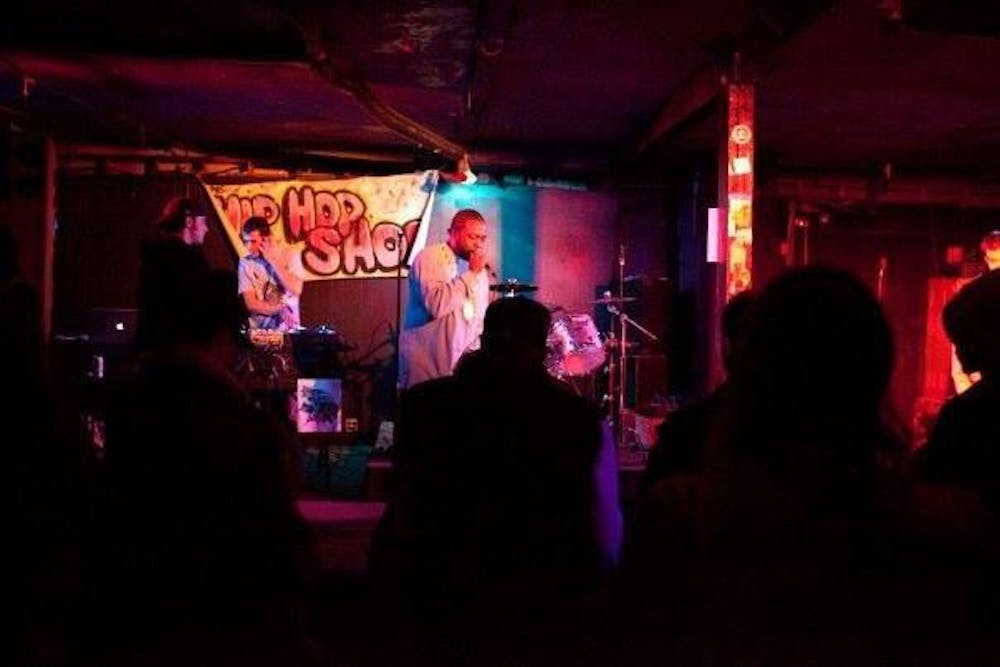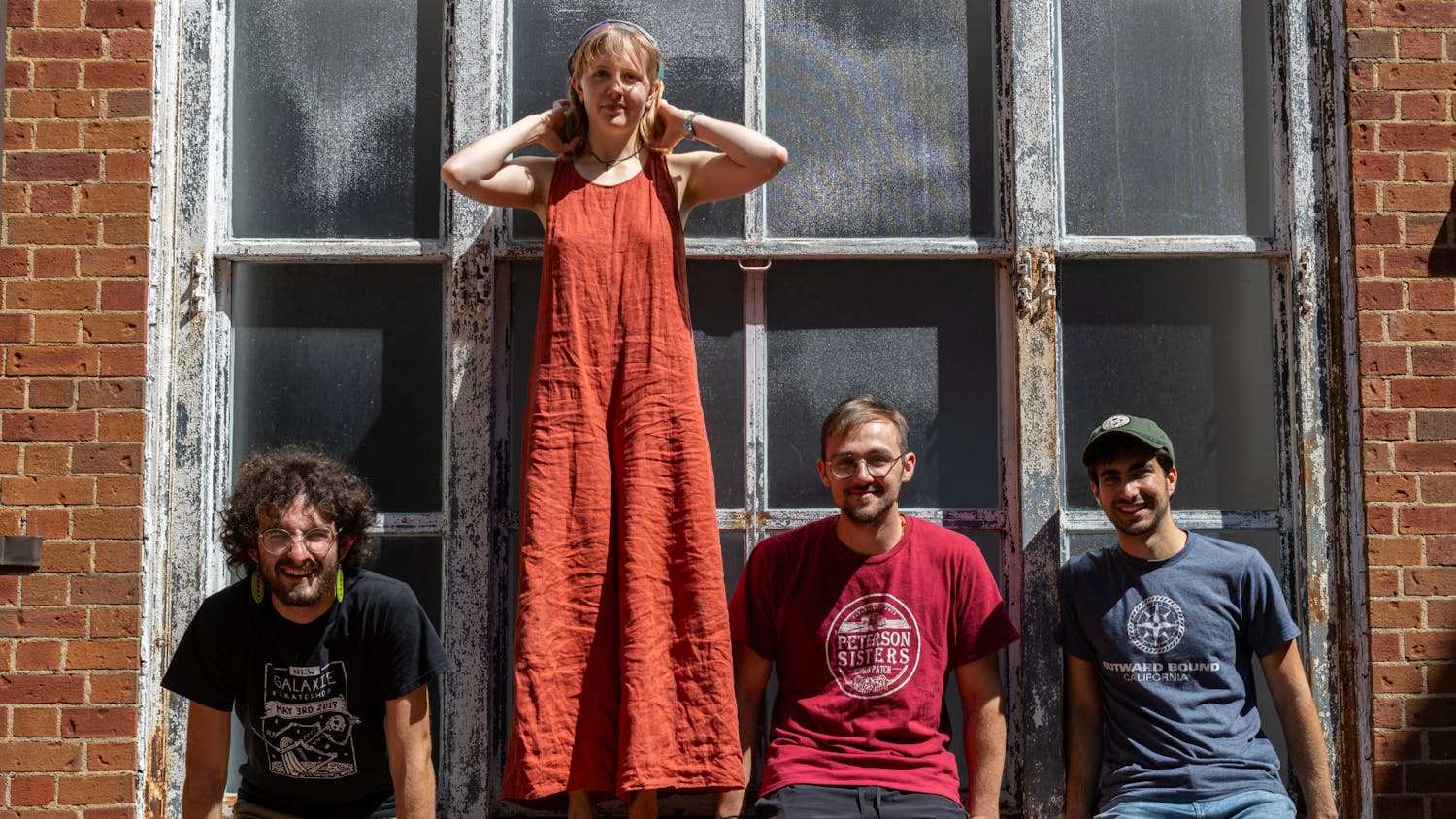Hip-Hop in Athens has been around since the birth of the subculture movement in the South Bronx 1970s, but as the years progress, the culture of hip-hop remains a mystery to most students on campus.
The DysFunktional Family, a rap duo based in Athens, has been performing at hip-hop shows together for so long, they said they could barely remember when they even got started.
“In the ‘80s, everyone was listening to hip-hop already,” Ryan “Emcee Schwartz” Schwartz, the lyricist of DysFunktional Family, said. “So by the time the ‘90s came around, you couldn’t just help but get involved with it.”
When hip-hop first began to emerge in Athens, Schwartz said many people in the area were hesitant because of the stigma that hip-hop and rap music had at the time.
“There was, like, a music scene, then there was, like, a rap scene, and people frowned against the rap scene,” Schwartz said. “It’s because it was different. People thought it was what you saw on MTV and what you see on BET at 3 a.m. — they would say, ‘Well, that’s hip-hop.’ ... We were just two kids who tried to experience it and bring it to Athens.”
Hip-hop is a subcultural movement generally known to be pioneered by black and Latino youth in the South Bronx during the 1970s. Young people would use various forms of creative energy as a method to combat the racial and socio-economic injustices faced by people of color at the time, according to Black Noise: Rap Music and Black Culture in Contemporary America by Tricia Rose.
The term “hip-hop” was coined by pioneer and Bronx emcee, Lovebug Starski, but it was DJ Afrika Bambaataa, “the father of hip-hop,” who recognized the youth’s engagement in deejaying, breakdancing, rapping (emceeing), graffiti and knowledge as part of hip-hop and coined them as the five major elements of the culture.
When discussing the culture of hip-hop in contemporary terms, many people believe hip-hop is just generally the element of rap music. But as it was explained by KRS-One, rapper, producer and political activist in his 2003 song 'Hip-Hop v. Rap,' “Rap is something you do / Hip-hop is something you live.”
In January, The DysFunktional Family, along with Columbus rapper D Jones, performed a “pop-up” show at Casa Nueva.
“This is Athens hip-hop,” Schwartz said after that performance. “If you were here tonight at this show, you just witnessed the definition of Athens hip-hop. … It’s the chill, mellow, hippie serenity but with a hard rock twist. … That’s my hip-hop, and that’s why I love it.”
Aside from the rap group DysFunktional Family, Athens has created a home for local emcees and hip-hop groups, over the years, such as Twisted Kids, Brick City Dance Crew, Tropidelic, Doxcity and P.O.W. But aside from the legendary local musicians, hip-hop has always remained an underground expression, where lovers of the culture share and express both their craft and spirit for the art.
From the Brick Streets to The Classroom
In the early 2000s, the Black Male Focus Group emphasized the “knowledge” and activism tenets of hip-hop culture. The group was for black men at Ohio University to talk about politics, race, class, gender and other top- ics as a way to have conversations about issues that impacted black men outside of the bounds of “polite education,” according to Akil Houston, an assistant professor of cultural and media studies.
As the focus group “died down” because key members graduated, another group emerged: the SOB, or the Students for African-American Brotherhood, which had more of a religious focus.
{{tncms-asset app="editorial" id="730733c4-7694-11e5-aac1-9b7160a8c111"}}
“It sort of took the political depth off campus and moved it toward a safe space,” Houston said.
But again, as SOB’s membership dwindled, another group, the Organization for African Unity, eventually came to take its place as a way for students to engage in activism and discuss politics.
In 2002, Houston, an alumnus, was approached by a student, Dedrick Rose, and a few other members from The Organization for African Unity because they wanted to create a group that centered on activism.
“The Organization for African Unity was pretty much defunct at the time,” Houston said. “(Rose) said, ‘There’s this national organization called Hip Hop Congress, and I think we need something like that on campus’. ... He was feeling we kind of needed something that speaks to what people on campus are doing.”
Hip Hop Congress is a non profit, international grassroots organization whose mission is to evolve hip-hop culture by inspiring social action and creativity within the community, according to its national website.
Houston and Rose understood that the name “the Organization for African Unity,” might intimidate people from joining. The two decided to combine an emphasis on hip- hop and activism and call it Hip Hop Congress.
In the same year, Houston said OU offered its first hip- hop class, which ended up consisting of most of the founding members of Hip Hop Congress.
For a dozen years, the OU chapter of Hip Hop Congress has hosted events, panels and different community service projects that catered to the hip-hop crowd.
“Consciousness never goes out of style,” Houston said. “That’s kind of the point to merge art and activism.”
Hip Hop Congress was a “catalyst,” for most local and Athens emcees, DJs, dancers and artists, according to both Daniel Hoffman and David Vazquez, members of Athens hip-hop and breakdance crew, Brick City Crew.
“People may go to parties and listen to rap music, but it’s not in the name of hip-hop culture, it’s just, ‘We’re going to a party and this is the music we like,’ ” Houston said. “You had people on campus who were emcees, and I don’t think they thought of themselves as were participating in hip-hop, it was just what we do. So Hip Hop Congress gave a platform for all of that to be recognized as a culture.”
Similar to many of the previous organizations, Hip Hop Congress had shifts in membership, developing a new and different focus in the organization, Houston said.
{{tncms-asset app="editorial" id="5b01e9e0-b22c-11e4-8ad3-cb84e61641d0"}}
For Hoffman, a former member of Hip Hop Congress and member of Brick City Crew, said he stopped returning to the club because of the lack of discussion surrounding the elements of hip-hop culture.
In a recent Hip Hop Congress meeting, Jacolby Hart, a member of the organization and a junior studying sport management, said out of the five main elements (DJ, break- dancing, graffiti, emceeing and knowledge), “the music element of the culture” is the most discussed because it’s the easiest to talk about in terms of hip-hop culture.
“It’s hard to resist. The most easily identifiable is rap music. It’s on the radio, it’s everywhere in media. It’s almost as much a presence as air,” Houston said. “If we’re talk- ing commercial rap music, it doesn’t require a lot of thought. ... If you got an infectious beat, something that a lot of people can sort of gravitate to, people will eat it up.”
Houston said people are connected to the culture of hip-hop itself because it can be used as a tool for means of expression.
“It speaks to when people find themselves in situations that are unjust, hip-hop is an excellent tool to challenge that,” Houston said.
Lost Spaces
Most hip-hop historians would note before the culture of hip-hop hit the American mainstream, hip-hop cultural events took place in the form of parties at local New York City parks, YMCAs and even community gyms.
Besides the Union Bar & Grill, which was damaged by the fire on Union Street in November 2014, and the other Uptown bars, there wasn’t much of a space to “practice the craft,” Hoffman said.
“Practice has always been a struggle,” Hoffman said. “It’s the trials of being a homeless b-boy.”
A b-boy, or b-girl, is a term stemmed from b-boying or breakdancing, which is a style of street dance to music such as hip-hop, funk and breakbeats, according to bboyscience.com.
Vazquez, another member of the dance crew, said not having a consistent space leaves a feeling of being “nomadic.”
“Every so often, we have to find a new place we call home,” Vazquez said. “Having consistency is key to where we practice and where to foster a community.”
Vazquez said one of the best feelings when practicing is seeing that like-minded people are on his side, which motivates him to continue.
“One of the best parts of practice is that communal feeling,” Vazquez said. “When you have other people that know where you’re at and get to watch you develop ... that’s what keeps driving you.”
Houston said in terms of the future of Athens hip-hop, he hopes it still remains a “political vehicle” of expression.
“I think when people need to find a need to express themselves and have an outlet of resistance, hip-hop would do that,” Houston said. “Part of hip-hop has always been about resist and protest, even when it had been as overt. ... So I think as long as it’s in that space, it will be a vehicle by which people can sort of do those things.”
@its_candicew
cw73012@ohio.edu








